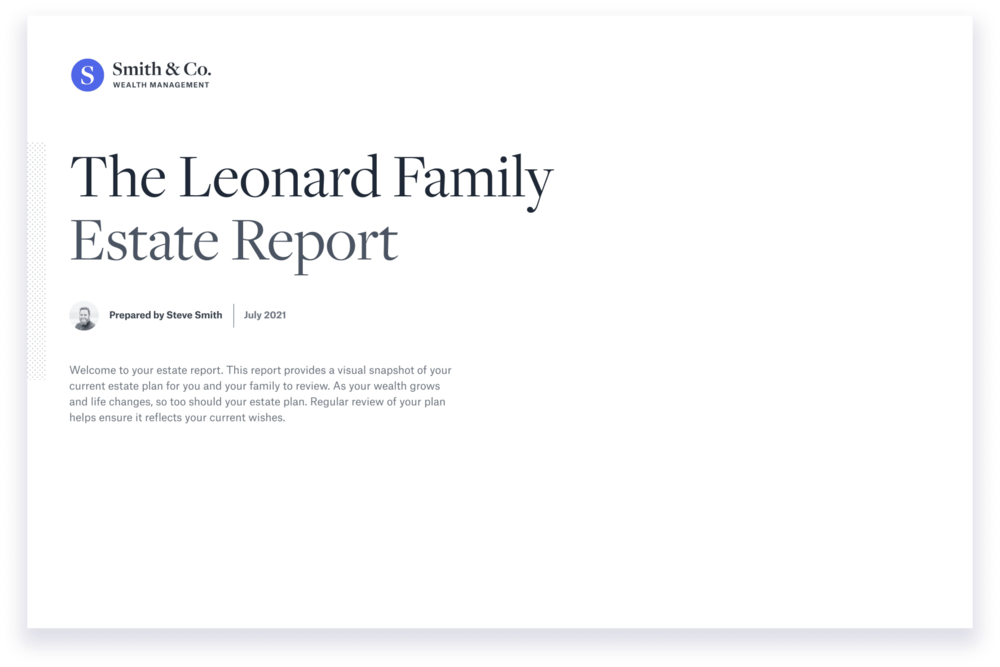 Vanilla
Vanilla
Estate Planning Horror Stories: 5 nightmare scenarios that will scare you into action

Most ghost stories are about unfinished business. Whether it’s a spooky campfire tale or a literary classic from the dark imagination of Edgar Allen Poe, a horror story plotline remains the same: the spirits of the departed haunt the living because there’s an unresolved matter preventing the deceased from moving on.
So what does all of this have to do with estate planning?
A poorly made or forgotten-about estate plan is like a ghost: It leaves your client and their loved ones vulnerable to hauntings of the financial kind. When people in mourning have to deal with their deceased relative’s unfinished business, legal entanglements, and complicated tax bills, it makes the grieving process harder. No one can move on.
We’re going to tell you five tales of estate planning terror that, as a financial advisor, you have the power to help your clients avoid. Be warned: They aren’t for the faint of heart. But they are lessons in what happens when you let estate planning fall by the wayside.
The case of the missing documents
Core estate planning documents exist to make a client’s wishes clear while detailing a plan of action. The lack of a will or estate documents will send your client’s family down a hellish legal spiral as they try to untangle assets.
Take the case of media legend Larry King.
The broadcasting superstar died on January 23, 2021, leaving behind a $2 million estate and, according to Law and Crime, “one colossal legal battle over his last will and testament.”
That’s because in October of 2019 (two years before his death), King wrote the following letter:
‘This is my Last Will & Testament. It should replace all previous writings. In the event of my death, any day after the above date I want 100% of my funds to be divided equally among my children Andy, Chaia, Larry Jr Chance & Cannon.’
— LARRY KING
In the state of California, informal letters can count as wills, but not always. Because King had unfinished legal proceedings and had failed to designate an executor for the estate, King’s letter raises unanswered questions:
-
If the letter is deemed a legal document, who should administer the estate? As the eldest remaining child, Larry King Jr. claims that he is in charge. But there are no documents in King Sr.’s handwriting indicating that should be the case.
-
Two of King’s oldest children, Chaia King, 51, and Andy King, 65, both died in 2020—a year after King wrote the letter. Who gets their portion of the inheritance? The remaining siblings or Chaia and Andy’s heirs?
-
If Larry King Jr. is in charge, who will call in his debt? King Jr. borrowed almost a quarter-million dollars against his portion of the estate while his father was alive, which means there may be a conflict of interest when it comes to distributing the inheritance to his siblings (and possibly his deceased siblings’ heirs).
-
What about King’s seventh and soon-to-be-ex wife? When he died, King Sr. was in the process of divorcing Shawn King, his wife of 22 years. King had named Shawn the executor of his estate in his 2015 will. Shawn now insists the 2019 letter isn’t a legal document because it was written after King had a stroke, and he wasn’t mentally competent to make a binding decision.
Now the wife and the eldest son have locked horns over who should be in charge of the estate and who should get what. The court case could go on for years and could end up costing the King family a significant chunk of the estate they’re feuding over.
The twisted irony of this terrifying tale is that King left the letter to make his wishes clear—but the lack of formal estate planning documents undermined his intentions.
The lesson for financial advisors
As their financial advisor, you have every reason to talk with your clients about what’s changing in their lives. If you discover a major change, such as a medical condition or a divorce, have your client review their estate plan with an attorney to determine if documents are missing. You never know what kind of tragedy the absence of a single core document could lead to.
To make advising for these major changes in life easier, Vanilla helps generate opportunities, like the ones mentioned above, based on your client’s existing planning and presents them in an easy-to-understand report. To see more examples of opportunities, download a sample report below.

The revenge of the abandoned estate plan
Signing and forgetting an estate plan can lead to dreadful consequences, like hefty legal costs and additional emotional trauma, for grieving loved ones.
Let us turn to the haunting tale of Hollywood filmmaker John Singleton. The celebrated director and producer slipped into a coma in April of 2019. While he lay unconscious in his hospital bed, his family discovered that Singleton had never created a medical directive or a power of attorney in the case of his incapacity. This sparked a family battle over guardianship.
Thirteen days later, when Singleton passed away, the family was horrified to learn that he had never updated his final will, created in 1993.
According to Legacy Assurance Plan, “In the 26 years since [creating the will], Singleton fathered six more children with different women—but he never updated his will to reflect the additions to his family.”
The Singleton estate is estimated at $38 million dollars. With a fortune at stake, there will undoubtedly be infighting and ruined relationships as his family goes to war over their portion of the estate.
The lesson for financial advisors
There are two lessons in this shocking story:
-
No one can predict when an accident or illness may render a client unable to express their wishes for medical care or financial decisions. Advise clients to discuss their medical directives and powers of attorney with their lawyers.
-
Estate planning documents need regular maintenance. It’s wise to partner with an estate planning attorney so your firm can perform regular estate plan check-ups for clients. If left untouched for decades, an abandoned estate plan can tear a family apart.
The chilling tale of the fiendish fiduciaries
It’s crucial that the person to whom your client gives decision-making power over their estate is trustworthy and capable. If the client chooses the wrong person for the job, the fiduciary can abuse power and let greed overtake a sense of responsibility (both while the client is alive and after they’re gone).
Take the calamitous tale of Beverley Schottenstein. The former wife of a department store mogul trusted her financial advisor grandsons to manage $80 million in assets in her retirement. She designated them as fiduciaries for her estate so that even when they changed firms, her account moved with them.
Unbeknownst to Beverley, her beloved grandsons exploited her by placing the assets in risky investments just so they could earn big commissions.
“Beverly Schottenstein alleged that her grandsons made a number of ‘extremely complex, highly risky’ investments worth more than $72 million, which led to losses of more than $10 million, but yielded the men and JP Morgan hundreds of thousands in fees,” reports the Tampa Bay Times.
The grandsons also charged thousands of dollars on Beverley’s credit card each month—to the point where her bank account was frozen due to too much activity.
At 91 years old, Beverley Schottenstein was forced to fight for her financial freedom and her legacy. While she ultimately won the legal battle (she was awarded $19 million in damages), it destroyed her family.
“We were close. The entire family is close,” Beverley said in an interview with Bloomberg. “They had no right to steal from their grandmother. If they needed something—anything, god forbid, that had to be done with money—I was right there. I would help them all the way.”
The dark irony of this family soap opera: Had the grandsons treated her finances ethically, they stood to inherit much more than the commissions they earned.
The lesson for financial advisors
It’s a fairly common practice for financial advisors to offer their services to family members.
As the Bloomberg article observes, “family money, in fact, often provides the seed for advisers to break into the business.”
But the Schottenstein case demonstrates “just how far off the rails that kind of relationship can go.”
We’re stating the obvious, but if you are in charge of a relative’s fortune, treat it with the same respect as you would any other client’s money.
Another lesson from this awful parable: offer clients guidelines on choosing fiduciaries. Just because the fiduciary is a relative doesn’t mean they have the client’s best interest at heart.
The fiendish fiduciary, Part 2: the bad beneficiary
Even if your client chooses a trustworthy fiduciary, if they don’t update beneficiaries, there’s a chance the wrong people will get the inheritance.
Listen, if you dare, to the twisted tale of Egelhoff v. Egelhoff.
David and Donna Rae Egelhoff were an unhappily married couple who decided to divorce. Two months after the divorce was finalized, David died in a car crash, leaving behind a life insurance policy and a pension plan. Although David had two children from a previous marriage, he had failed to designate them as beneficiaries after his divorce.
Despite suing for the money, the kids ultimately lost the case. Thus, the money went to the ex, and David’s children were left with nothing but legal costs.
The lesson for financial advisors
Regularly review beneficiary designations with clients; if they need to make changes, advise them to consult an estate planning attorney.
The eternal darkness of the empty trust
Let’s say that your client does the right thing and has an attorney set up a trust. Unless they keep documents updated and make wise financial decisions, there’s no guarantee the client’s assets will transfer to the trust upon their death.
Borchers Trust Law Group shared this chiller about some well-meaning clients who had set up a trust:
“We completed the transfer of [the clients’] real estate and the assignment of the LLC properly with them, but unfortunately their account ownership and beneficiary change forms were never completed.”
When the clients died, the assets were in their names rather than in the trust, “making the estate vulnerable to probate, and leaving their son with an unfunded trust.”
Not only did the son have to deal with the grief over the death of his parents, but he also had to contend with a lengthy, unanticipated probate process.
There’s even more to this dismal anecdote:
“Their son may now also have to pay an estate tax, something which could have been reduced or avoided altogether if his parents’ trust had been properly funded,” reports Borchers.
The lesson for financial advisors
As a trusted financial advisor, you can help clients reach their goals so they leave behind a financial legacy. As you build a comprehensive plan for client assets, collaborate with an estate planning attorney to ensure that the assets properly transfer to a trust.
You can also keep an eye out for changes in estate tax policy and let your clients know if they should revisit their estate plan with an attorney to avoid a heavy tax burden that could impact their assets.
Don’t let estate planning horror stories haunt your clients
Help your clients and their loved ones avoid nightmare scenarios by reporting on their current estate health and communicating the risks of leaving estate planning undone. Use Vanilla to help drive these vital conversations about the importance of estate planning. Start by getting in touch with us here.
Help your clients stay in sync with changes in law or life circumstances
https://www.justvanilla.com/schedule-a-call
This article is for educational purposes only and should not be considered legal advice. If you feel that the information in this article is pertinent to your situation, you may wish to consult a qualified attorney for advice tailored to your circumstances.
Published: Mar 26, 2021
Ready to get started?
Deliver a whole new client conversation experience
Talk to our sales team today.
